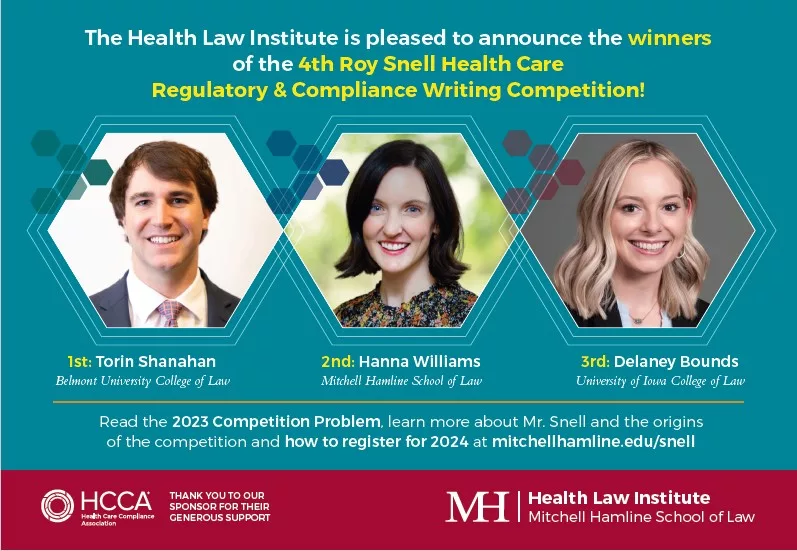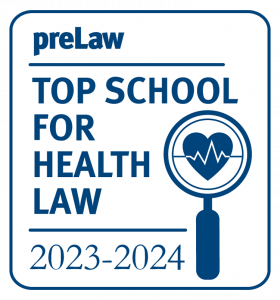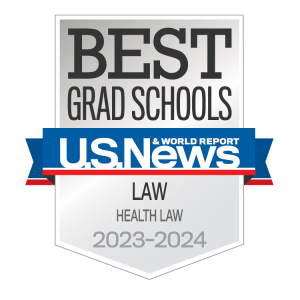 Health Law Institute – A Message from Director Barbara Colombo
Health Law Institute – A Message from Director Barbara Colombo
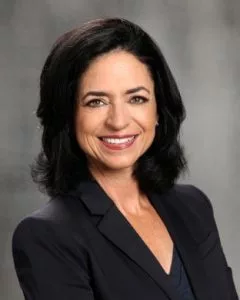 Health law revolves around patients and consumers, not a casebook. As a former critical care registered nurse, I have witnessed firsthand the powerful influence the law has on the delivery of health care.
Health law revolves around patients and consumers, not a casebook. As a former critical care registered nurse, I have witnessed firsthand the powerful influence the law has on the delivery of health care.
Mitchell Hamline’s Health Law Institute ensures that students specializing in health law graduate with the ability to identify legal pathways to influence health policy and serve others. Students who pursue our health law certificate have access to a comprehensive and cutting-edge education through courses addressing foundational principles in health law in the areas of medical liability, health equity, mental health, provider licensure, health care quality and privacy, fraud, and abuse, antitrust, health care finance, and many others. Additionally, Mitchell Hamline is one of the few law schools to offer a health care compliance certificate program accredited by the Compliance Certification Board (CCB). This certificate program arms students with the tools to help organizations effectively manage risk and protect patient safety.
Mitchell Hamline’s health law program is robust, sophisticated, and responsive. We leverage an advanced curriculum taught by health law and compliance experts so that our students are highly competitive in the marketplace. Each semester the Health Law Institute offers 10-12 courses attracting 120-270 students. Our summer term includes four courses and draws 160-190 students.
Mitchell Hamline offers students unparalleled experiential learning opportunities in a variety of settings including our Health Law Clinic, where students work alongside health care practitioners representing low-income patients on legal matters related to their health. Learning by doing is the best way to connect legal theory to practice. This skills-based teaching approach is the hallmark of the institute.
As the country continues to wrestle with issues of profound importance including public health emergencies like the pandemic, access to health insurance, end of life issues, and medical mistakes, the Health Law Institute will push forward with new courses, innovative student experiences, and the development of new programs. HLI’s student-focused mission will not waver: empowering our students, through course work and experiences, to be ready to roll up their sleeves and translate the rule of law into meaningful interventions rooted in justice, health policy, and science.
Mitchell Hamline is consistently ranked among the top health law programs nationally by U.S. News and World Report and is one of 15 law schools receiving an A+ grade for its health law curriculum in 2023 by Prelaw Magazine, published through National Jurist.
Barbara Colombo
Professor of Law
Director, Health Law Institute and Health Care Compliance Program
 Health Law Institute Alumni Success
Health Law Institute Alumni Success
Giving students a competitive career edge through a comprehensive approach
Our 2023 alumni survey results tell the story better than words can. Our graduates have secured competitive positions across all parts of the health law and care industries, including, but not limited to:
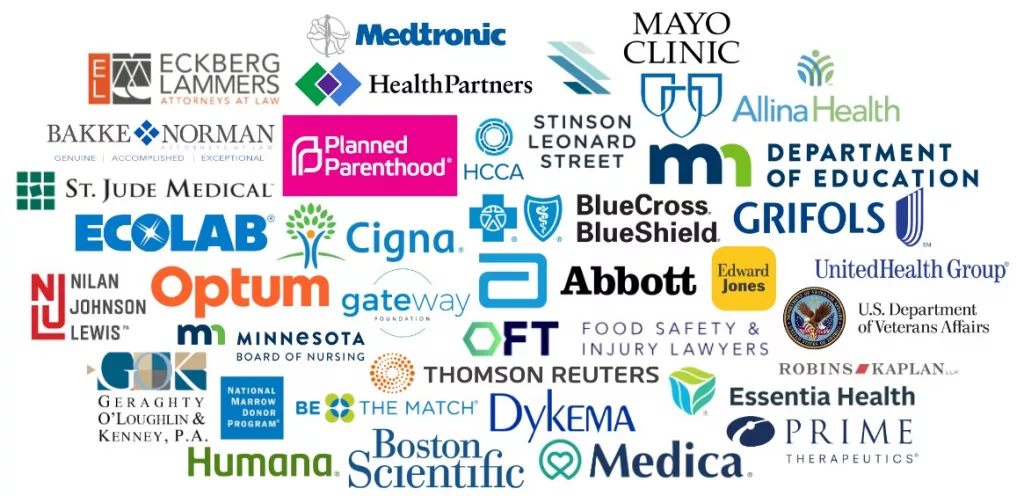
An expanded list from our alumni can be found on HLI’s Alumni Careers page.
Alumni Spotlight – James Ortmann ’13 Senior Counsel, Office of Counsel to the Inspector General in the U.S. Department of health & Human Services
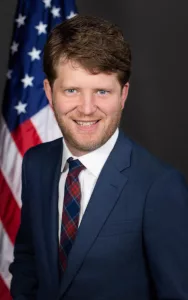 Tell us about your current role.
Tell us about your current role.
I work in the Advice Branch, which means I practice in the agency’s in-house-counsel group. I provide legal advice to OIG’s auditors, agents, evaluators, and leaders. I work on the discretionary team, so my work concerns oversight of the parts of HHS that are funded with yearly appropriations. This is basically everything but Medicare, Medicaid, and some other CMS programs. As you can imagine, this is a broad portfolio. But most of my work centers on administrative law, the Inspector General Act of 1978, health and human-services programs for Native Americans and Alaska Natives, and HHS grants. In short, this means I answer legal questions about my agency’s authority and about how the HHS programs we oversee operate. It also means that I review reports my agency publishes to ensure they are legally sound and persuasively present OIG’s recommendations.
What drew you to this position and the work you do as a regulator?
I sought this position (and my previous one at the Minnesota Department of Human Services, Office of the Inspector General) because I wanted a public-service career involving the False Claims Act, Anti-Kickback Statute, and the Stark Law. While that’s not where I landed—those laws are a minuscule part of my practice—I enjoy my current practice so much more than I would a practice that focused in just those areas.
As a Mitchell Hamline graduate, what advice do you have for law students interested in pursuing this type of career path?
I have two bits of advice for graduates, one concerns your financial health and the other your mental health. First, after starting your first job, ensure you’re saving enough in your 401k (or equivalent) to get the full match your employer provides. This is a guaranteed 100% return. Then contribute as much as you feel comfortable with. If this amount is less than the contribution limit, each time you get a raise, increase your contribution by an amount equal to the raise. Repeat until you hit the contribution limit. At the beginning of your career retirement is likely off your radar; this will ensure that retirement isn’t something you ever worry about.
Second, resist the urge to center your identity solely around being a lawyer or practicing a certain kind of law. This will have at least three benefits. First, it will create space to consider different practice areas, and perhaps later in life, different careers that better align with potentially changing values and passions. Leave space for serendipity. Second, resisting this urge will leave space for you to be and do so much more. Whatever it is that creates joy in your life—your family, friends, and interests—will have the cultivated soil necessary to flourish. Third, separating your identity from your job will help you better get past the mistakes you’ll inevitably make as a lawyer. When you tie your identity too closely to what you do, anytime you fail you will take it as a failure of your true self. It won’t be that you failed in the practice of law. Instead, it will be you as a person are a failure. Protect yourself from this unnecessary trap.
What is one thing you’re most proud of?
I am proudest of the time and energy I’ve spent as a partner to my wife and father to my daughter, but I suspect readers are looking for my proudest professional accomplishment. My proudest professional accomplishment is the advice I’ve given clients, which they have used to improve the quality of health care provided in Indian Health Service hospitals.
 Mitchell Hamline’s Health Law Institute
Mitchell Hamline’s Health Law Institute
Roy Snell Health Care Regulatory & Compliance Writing Competition attracted outstanding health law students from around the country for 2023
The 2024 competition will run from Thursday, February 1st until Wednesday, March 13th, 2024. All registered students will be sent the Competition Problem after registration closes. They will have six weeks to read it and write and submit their memorandum and PowerPoint submissions. The top three winners will receive a monetary prize for their work and paid registration for the 2025 HCCA Annual Compliance Institute (valued at over $1,500). Visit the competition page for more information.
Certificate Specializations: Our Health Law and Health Care Compliance Certificates offer students a specialized and customized curriculum to help them achieve their goals and aspirations and enter the market with a competitive edge. The Health Care Compliance Certificate is one of only a few in the country to be accredited by the Compliance Certification Board (CCB).
Food Law Center: The Health Law Institute’s Food Law Center offers students specialized education in the legal challenges associated with food production, manufacturing, and consumption of food including a new course that was offered spring 2023 titled “Food Safety and the Law.”


